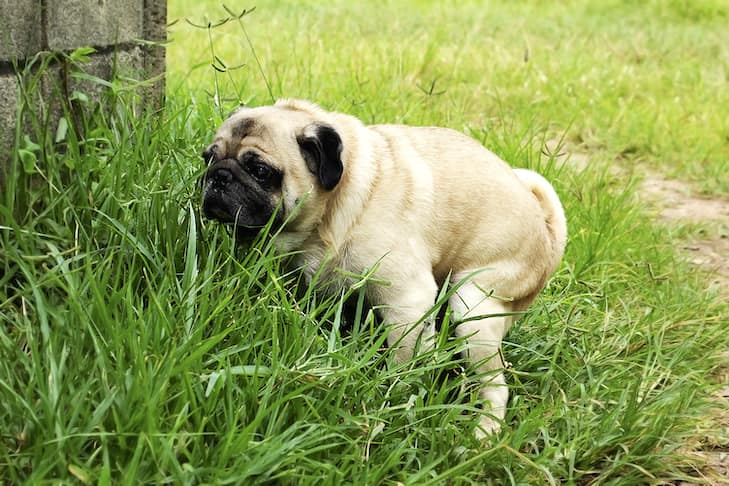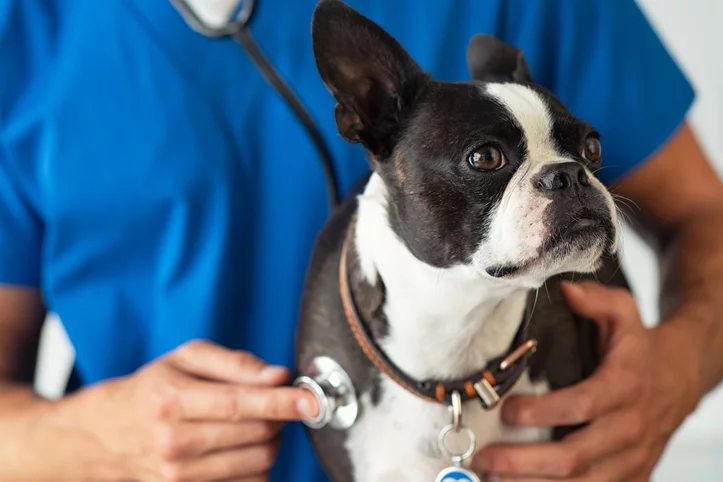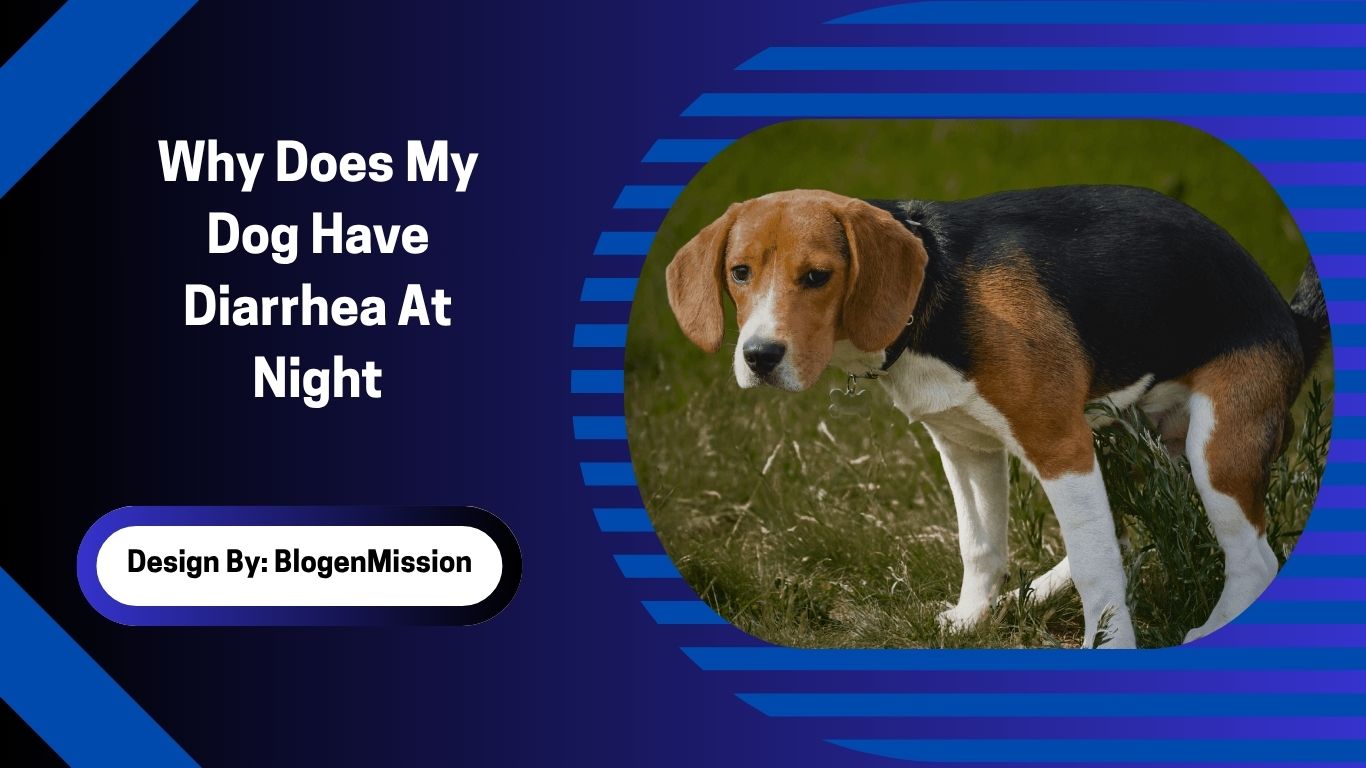Nighttime diarrhea in dogs can result from dietary issues, stress, parasites, or medical conditions. Identifying triggers, adjusting food, and seeking vet advice helps manage and prevent these disruptive overnight episodes.
Dogs are creatures of habit, and any sudden change in their behavior—especially something as alarming as nighttime diarrhea—can be concerning for pet parents. While diarrhea in dogs is relatively common, episodes that only occur at night could indicate a deeper issue that warrants attention.
This comprehensive guide will explore the potential causes of nighttime diarrhea in dogs, how to identify serious symptoms, what steps to take at home, and when to consult a vet.
What Is Considered Nighttime Diarrhea?
Nighttime diarrhea is defined as loose or watery stools that occur specifically during the night, often disturbing your dog’s sleep—and yours. Unlike regular diarrhea, nighttime episodes can indicate something cyclical, reactive, or environmentally triggered, such as anxiety or evening meals.
Common Causes of Dog Diarrhea at Night

Several factors could be behind your dog’s unexpected nighttime bathroom visits:
- Sudden dietary change
- Food intolerances
- Intestinal parasites
- Stress-induced colitis
- Inflammatory Bowel Disease (IBD)
- Pancreatitis
- Medications (e.g., antibiotics or NSAIDs)
Night-specific issues may also be linked to the timing of meals, medications, or increased anxiety during nighttime.
Food Sensitivities and Diet-Related Issues
One of the most common triggers is what your dog eats before bed. Many commercial dog foods contain fillers, preservatives, or allergens like:
- Chicken
- Grain (e.g., corn, wheat)
- Artificial coloring
- Soy
A dog’s digestive system may react a few hours after ingestion, leading to symptoms that show up at night. Switching food brands, feeding table scraps, or giving new treats in the evening can trigger sudden-onset diarrhea.
Tip: Keep a food journal of what your dog eats and note when symptoms occur. Look for patterns over several days.
Parasites and Infections
Intestinal parasites such as giardia, roundworms, and hookworms can cause chronic or intermittent diarrhea. Some of these parasites are nocturnally active, meaning they disrupt digestion during the night more than the day.
Signs to look out for:
- Mucus in the stool
- Vomiting
- Weight loss
- Scooting or itching
Infections like bacterial enteritis or viral gastroenteritis (canine parvovirus) may also cause loose stools and worsen at night if the dog is stressed or inactive.
Stress and Anxiety
Stress-related diarrhea, also known as stress colitis, can occur due to:
- Separation anxiety
- Loud nighttime noises (e.g., fireworks, thunder)
- Change in environment
- New pet or family member
Just like humans, dogs experience gastrointestinal reactions to emotional distress. Cortisol, the stress hormone, increases gut motility, leading to looser stools—often at night when the environment changes (quiet house, darkness, etc.).
Underlying Medical Conditions
Persistent nighttime diarrhea may signal underlying medical issues, including:
- Inflammatory Bowel Disease (IBD)
- Exocrine Pancreatic Insufficiency (EPI)
- Hyperthyroidism or Addison’s Disease
- Liver or kidney dysfunction
These conditions often interfere with nutrient absorption and digestive balance, leading to poorly formed stools. Dogs with IBD, for example, may experience flare-ups during periods of inactivity or stress, such as nighttime.
Medication Side Effects
If your dog is on any medications, especially:
- Antibiotics
- NSAIDs (nonsteroidal anti-inflammatory drugs)
- Dewormers
- Steroids
…these may disrupt the gut microbiome and cause temporary or chronic diarrhea, more noticeable at night due to digestion time after evening doses.
Always read medication guidelines, and consult your vet if symptoms persist beyond 48 hours.
How to Diagnose the Root Cause?
To get to the bottom of your dog’s nighttime diarrhea, a multi-step approach is best:
A. Fecal Exam – Checks for parasites and bacteria
B. Blood Work – Rules out organ issues or inflammation
C. Food Elimination Trial – Identifies allergies or intolerances
D. Abdominal Ultrasound – Helps detect IBD or tumors
E. Stress Evaluation – Observe behavior patterns, triggers
Keep track of:
- Stool consistency (using the Purina Fecal Scoring Chart)
- Frequency and urgency
- Color (black or bloody stool requires emergency care)
When to See a Veterinarian

Nighttime diarrhea becomes urgent if your dog also shows:
- Lethargy
- Blood in stool
- Loss of appetite
- Vomiting
- Dehydration (dry gums, sunken eyes)
- Weight loss
Puppies, senior dogs, or those with chronic health issues should see a vet after 1–2 episodes of diarrhea, even if they seem otherwise fine.
Home Remedies and Management Tips
If your dog seems stable but has mild diarrhea at night, you can try these home management steps:
1. Fast for 12–24 Hours (Adults Only)
Give the gut time to rest. Ensure access to clean water.
2. Introduce a Bland Diet
Start with:
- Boiled chicken (no skin, bones)
- White rice or plain pumpkin (not pie filling)
- Unsweetened plain yogurt (optional)
Feed small portions every 3–4 hours for 2–3 days.
3. Probiotics
Veterinary probiotics like FortiFlora or Proviable-DC can rebalance gut flora and reduce inflammation.
4. Consistent Feeding Time
Feed dinner earlier (5–6 PM) and avoid late-night snacks.
5. Hydration Boost
Use unflavored Pedialyte or a vet-recommended electrolyte solution to prevent dehydration.
Preventing Future Episodes
Consistency is key to preventing nighttime diarrhea. Consider the following:
- Stick to a stable diet (avoid table scraps)
- Gradually transition new foods over 7–10 days
- Keep mealtimes consistent
- Avoid evening treats high in fat or fiber
- Use calming aids for anxious dogs (CBD, Adaptil, calming vests)
- Regular vet check-ups and deworming
FAQs:
1. Can anxiety cause my dog to have diarrhea only at night?
Yes, anxiety can trigger nighttime diarrhea. Dogs may become stressed in the quiet nighttime hours due to separation, environmental changes, or noises, which increases gut activity and results in loose stools during the night.
2. Should I feed my dog earlier to prevent nighttime diarrhea?
Feeding your dog earlier in the evening can help. Late meals may not digest properly before bedtime, leading to overnight bowel issues. Try serving dinner by 5–6 PM for better digestion.
3. Is it okay to withhold food if my dog has diarrhea at night?
Yes, for adult dogs, a short fast of 12–24 hours can help reset the digestive system. Always provide water and consult your vet before fasting puppies, seniors, or dogs with health issues.
4. How can I tell if my dog’s diarrhea is from parasites?
Parasite-related diarrhea often includes mucus, weight loss, scooting, or visible worms. A fecal test from your vet can confirm the presence of intestinal parasites like giardia, hookworms, or roundworms.
5. Are probiotics effective for dogs with recurring nighttime diarrhea?
Yes, probiotics help restore healthy gut bacteria, especially after stress, dietary changes, or antibiotic use. Vet-approved products like FortiFlora can reduce inflammation and improve stool consistency with consistent use.
Conclusion:
Nighttime diarrhea in dogs can stem from a range of causes including food sensitivities, parasites, stress, or medical conditions. While occasional issues may resolve with a bland diet and probiotics, recurring symptoms warrant professional evaluation. Pet owners should monitor food intake, avoid late-night treats, and maintain a consistent routine. Early veterinary intervention helps prevent dehydration and identify underlying illnesses. With proper care and observation, your dog can enjoy restful, healthy nights—free from unexpected trips to the yard.
Related Post:
- My Cat Is Limping But Acting Normal – Should You Be Worried!
- How Often Should Cats Get Rabies Shots – You Need to Know!
- Why Is My Cat Not Drinking Water – Causes, Risks & Solutions!
